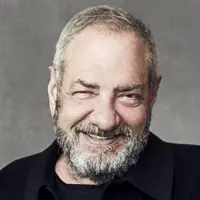Will Dick Wolf be held accountable for his misleading police shows?
-

Wolf's Law & Order, Chicago and FBI franchises have had an outsize influence on the collective imagination that have made him a target of criticism, especially amid the George Floyd police brutality protests, says Meredith Blake. "Most of these shows are set in racially diverse cities but have disproportionately white writers rooms," says Blake. "They nearly all employ former police officers as consultants and tend to downplay — and in some cases, excuse — the prevalence of police violence against Black people." Earlier this year, Color of Change and USC Annenberg Norman Lear Center released a report titled "Normalizing Injustice: The Dangerous Misrepresentations That Define Television’s Scripted Crime Drama,” which found that the cop show “genre glorifies, justifies and normalizes the systematic violence and injustice meted out by police, making heroes out of police and prosecutors.” The report also found that Law & Order: SVU had an all-white writers' room as recently as the 2018-19 season (it now has two minority writers), while Chicago P.D. has one black writer. “The networks cannot be let off the hook for continuing to give him carte blanche to produce content that contributes to all the things that are killing us,” says Color of Change president Rashad Robinson says of Wolf. While Wolf insisted earlier this year that his shows are apolitical, Robinson says: "You have to walk with blinders on to believe that you can be apolitical. He has shows about crime and justice and district attorneys and judges and elected officials inside of black and brown communities, but he believes they’re ‘apolitical.’ He has all-white writers rooms on shows that are set in cities like New York, but they’re ‘apolitical.‘ Then folks will call Ava (DuVernay, creator of When They See Us) ‘political.’ We have to disrupt this idea that a rich white man who clearly has had to have his head in the sand for maybe his whole life could think he could produce these shows and they could be apolitical.” As Blake notes, "the Color of Change report identifies the 1990 premiere of Law & Order as a turning point in the history of television. It was once commonplace for legal dramas to center on defense attorneys (Perry Mason, Matlock) and other champions of the innocent (Murder She Wrote, Highway to Heaven), but in the early ‘90s detectives, prosecutors and district attorneys became the heroes." Blake also points out that the phrase "Law & Order" was "popularized by conservative politicians in the 1960s, most famously Richard Nixon, and often deployed as a racist dog whistle. It has also become President Trump’s favorite rallying cry in recent weeks as he searches for a galvanizing message for his imperiled reelection campaign." Law & Order also perpetuated the false notion that the criminal justice system is efficient and evenhanded, with nearly every case going to trial, when in real life about 97% of criminal cases are resolved through plea deals. "Reflecting this reality presents a major challenge to showrunners of crime procedurals," says Blake, "which almost by definition depict law enforcement as more successful and effective than it actually is."
ALSO:
- Stephen Colbert jokes defunding police would change CBS' primetime lineup: “Defunding the police might sound a little scary to some people, like CBS, they’d have to change their entire primetime lineup," Colbert said on Tuesday's Late Show. "S.W.A.T. would have to become Community Health Services and NCIS would stand for No Cops! Instead Soup. It would still have a lot of murders in it but it would also have a lot of bisques and chowders."
- Ice-T says Law & Order: SVU has "tried to be as fair as it can possibly be" but admits "we romanticize that job when it’s not that romantic": "You have got the black gang bangers, but you have also got the black judge, you’ve got the black attorney,” Ice-T tells Page Six. He also acknowledges that “I am wearing Gucci. Mariska (Hargitay) is wearing designer clothes. Cops can’t afford to do that, so in a way we romanticize that job when it’s not that romantic.”
- Wyatt Cenac's Problem Areas tried to report on the NYPD's nearly $1 billion training facility: "There’s something in the structure of politics that will make a person lose their convictions real quick," Wyatt Cenac says of the police union's influence on politicians. "The police union has been able to put a lot of pressure on these politicians, to give them the freedom to do what they want. One of the stories we wanted to do and couldn’t get access — we wanted to go visit the training facility that the NYPD has here in New York that cost $950 million. That’s $950 million of city taxpayer money. And I think anybody who lives in the city, if you were to ask them how to spend a billion dollars, I feel like many would be like, ‘Well, wait a minute. Why are we spending it here when there’s so many other things we could spend it on?'”
- Tucker Carlson rails against Elmo and Sesame Street for their CNN town hall explanation of racism and police brutality protests
- Anderson Cooper breaks down while discussing George Floyd’s funeral with Dr. Cornel West
- Nathan Fielder mocks the Austin Police Department's suspicious "Thank You" cards tweet
- Trevor Noah criticizes police for "attacking protesters with no provocation"
- Henry Winkler's name trended on Twitter Tuesday because of his resemblance to NYPD's union boss
TOPICS: Dick Wolf, CBS, NBC, Chicago P.D., FBI, FBI: Most Wanted, Law & Order, Law & Order: Special Victims Unit, Sesame Street, Wyatt Cenac's Problem Areas, Anderson Cooper, George Floyd, Henry Winkler, Ice-T, Nathan Fielder, Stephen Colbert, Trevor Noah, Tucker Carlson, Wyatt Cenac, Black Lives Matter, Color of Change, Diversity
More Dick Wolf on Primetimer:
